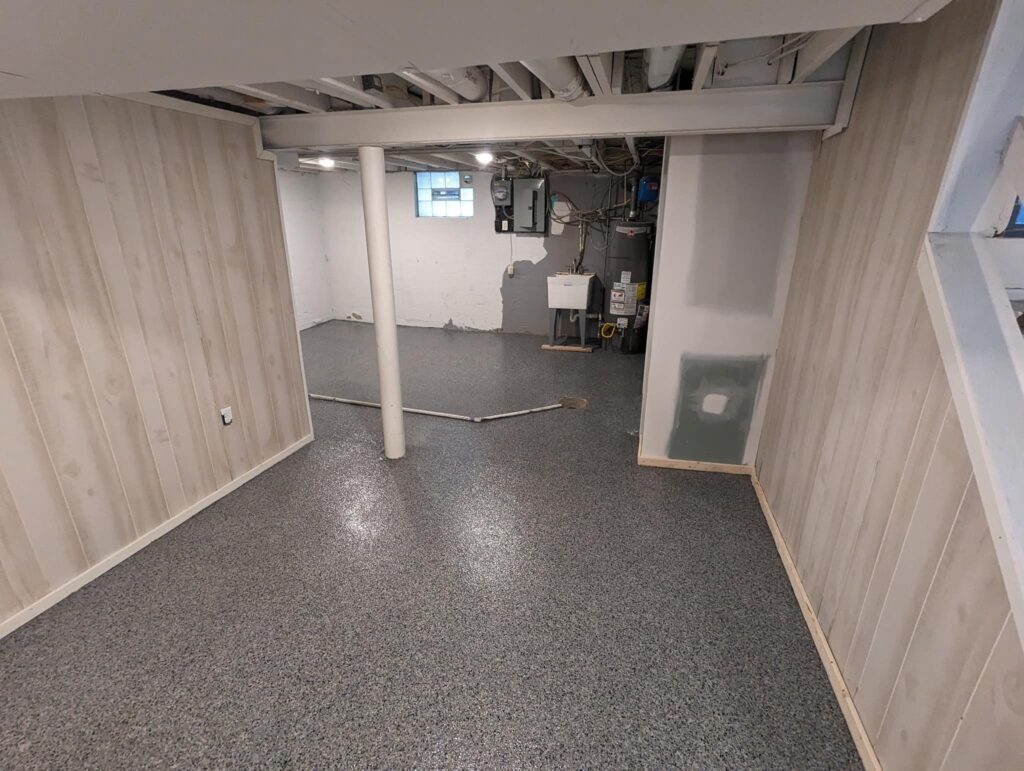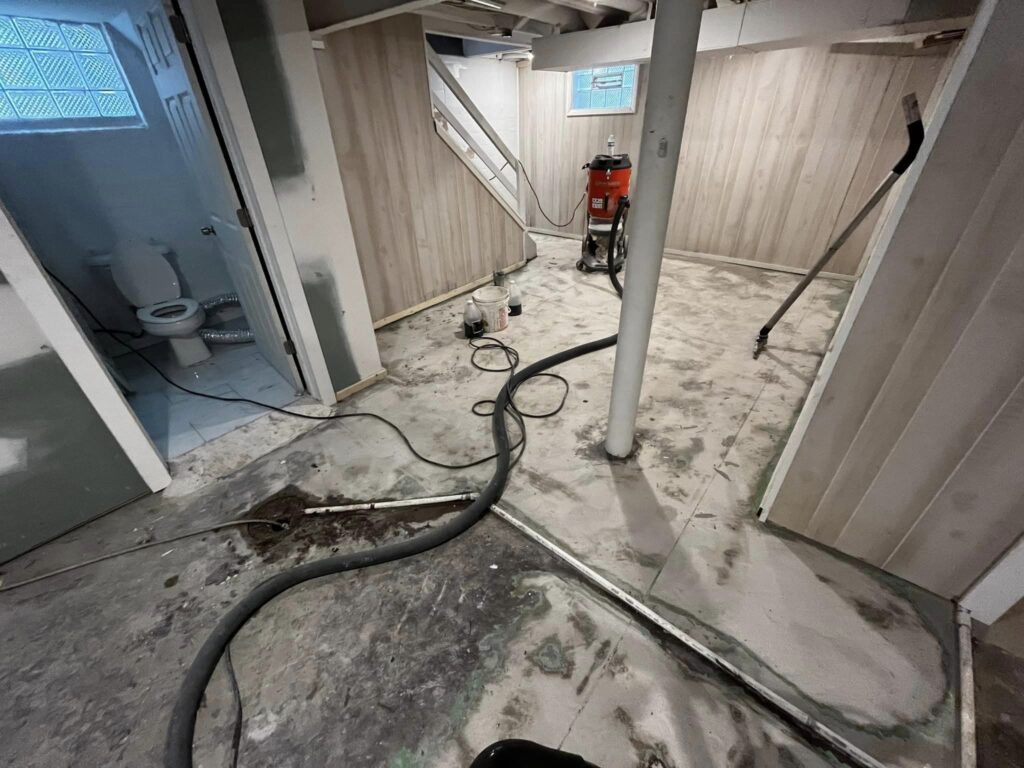Your basement may be the hidden gem of your home just waiting to be discovered. Whether it’s for additional living space, a storage area, or a workshop – the right touch can transform your dungeon-like downstairs into an integral part of your living environment. One often overlooked but vital step in this transformation is the application of a durable and aesthetically pleasing basement floor coating. This comprehensive guide is made to help West Chester Township residents understand the nuances, benefits, and steps involved in carrying out this crucial enhancement.
What is Basement Floor Coating?
Basement floor coating is a protective and aesthetic refinement to your basement floor. It’s a sturdy, liquid application that hardens into a seamless, durable, and often moisture-resistant surface, designed to shield your floor against stains, chemicals, and everyday wear.
Why Coat Your Basement Floor?For Protection
An uncoated basement floor is porous and can become the target of dampness or absorb stains. A proper coating forms a protective barrier, preventing moisture from seeping through and making cleaning a breeze.
To Enhance the Space
Basement floor coatings come in various colors and finishes, contributing to the overall aesthetics of your basement transformation.
It’s Cost-Effective Maintenance
The cost of coating your floor is a one-time investment that prolongs the life of your floor, significantly reducing the need for maintenance down the road.
Types of Basement Floor Coating
Several types of coatings are available, each with its features and suitability for various basement needs.
Epoxy Coatings
Epoxy coatings are a popular choice for their durability and resistance to chemicals and moisture. They offer a glossy, mirror-like finish.
Pros
- Extremely durable
- Impervious to most chemicals
- Offers a beautiful high-gloss finish
Cons
- Can be tricky to apply
- Not UV-resistant and can yellow over time if exposed to direct sunlight
Polyurea Coatings
Polyurea coatings are similar to epoxy but are more flexible, making them great for areas with temperature variations.
Pros
- Fast-drying and sets quickly
- Highly resistant to scratches and abrasions
- More flexible than epoxy
Cons
- Incredibly tough, but can be more difficult to work with due to rapid setting
Acrylic Coatings
Acrylic coatings are water-based and don’t produce as strong odors during application.
Pros
- Easy to apply
- Quick drying
- Environmentally friendly
Cons
- Not as durable as epoxy or polyurea
- May require more frequent re-application
Step-by-Step Guide to DIY Coating
Although DIY coating can be cost-effective, it requires a significant amount of patience and precision.
Preparing Your Floor
- Clear the Area: Remove all items from the basement and sweep away any dust, debris, and old paint.
- Inspection: Fix any cracks or damage on the floor. This step is critical, as a damaged floor can cause the coating to fail.
- Etching the Floor: Most coatings will require the floor to be sufficiently rough for the material to adhere properly. This can be done with a muriatic acid solution or a mechanical grinder.
Applying the Coating
- Priming the Floor: Some coatings may need a basecoat for better adhesion. Prime the floor according to the manufacturer’s instructions.
- Mixing the Material: Follow the manufacturer’s instructions for mixing the coating material.
- Apply the Coating: Use a high-quality roller or squeegee to apply the material evenly. Start from the farthest corner and work your way towards the exit to avoid trapping yourself.
- Allow to Cure: Proper curing time is essential before any foot traffic. This can take a day or more depending on the specific product and conditions.
Post-Coating Maintenance
Once the coating has cured, it’s crucial to stay on top of maintenance.
- Keep it Clean: Regular sweeping and mopping will help retain the shine and protect the floor.
- Address Spills Immediately: While the coating will protect against some stains, it’s best to wipe up spills as they happen to prevent any potential discoloration.
Choosing the Right Materials
The right materials for your basement floor coating will depend on various factors, including:
Climate
West Chester Township’s climate can be a mix of hot and humid summers, cold winters, and moderate spring and fall seasons. Look for materials that can handle these temperature extremes.
Soil Conditions
The type of soil in your area can affect moisture levels in your basement. Coatings with moisture barriers may be more suitable for homes with poor drainage or high moisture.
Budget
Determine a realistic budget for the project. Epoxy and polyurea tend to be more expensive but require less frequent reapplication. Acrylic is a more budget-friendly option that works in less aggressive environments.
Professional Services vs. DIY
Deciding whether to tackle the coating project yourself or hire a professional can be influenced by several factors.
Skill Level
Coating a basement floor is more challenging than painting a wall. If you have DIY experience and feel comfortable with the tasks involved, a DIY approach could be manageable.
Time and Patience
A professional service can complete the project faster than most DIY enthusiasts and is likely to produce a more uniform finish.
Cost
While professional services can increase the upfront cost, the longevity and quality of the application can be worth the investment, particularly with high-wear coatings.
Showcase of Local Projects
Real-life examples can be inspiring and informative. Showcasing local projects, complete with before-and-after transformations, allows readers to visualize the potential of a coated basement floor in their own homes.
Before-and-After Photos
Before-and-after photos can vividly demonstrate the dramatic change a coating can make to a basement floor’s appearance and function.
Testimonials
Genuine testimonials from neighbors and residents who have undergone the process can provide valuable insights and recommendations.
FAQs
Answering common questions about basement floor coating tailored to West Chester Township residents can help dispel common myths and address specific concerns.
How Long Does a Coating Last?
The longevity of a coating depends on type, foot traffic, and maintenance. Epoxy coatings can last up to 10 years with proper care, while acrylic coatings may need reapplication every 2-3 years.
Will Coating My Basement Floor Increase My Property Value?
A well-coated and maintained basement floor can add value by expanding the usable space of your home and by providing a clean and appealing aesthetic.
What Should I Do if My Basement Has a History of Water Issues?
Addressing any water issues is a must before considering a coating. Consult with waterproofing experts to ensure there are no underlying issues that could damage the coating.

Conclusion
Basement floor coating in West Chester Township can significantly enhance the value, aesthetics, and functionality of your basement space. Whether you opt for a DIY approach or enlist professional help, the choice to coat your basement floor is one that can lead to a more enjoyable and valuable home. By understanding the steps involved and choosing the right materials for your specific needs, you’re well on your way to transforming your basement into the space of your dreams. Remember, each home has unique requirements, so always tailor your approach to your individual situation. With this guide in hand, you’re ready to take on the rewarding project of basement floor coating.

